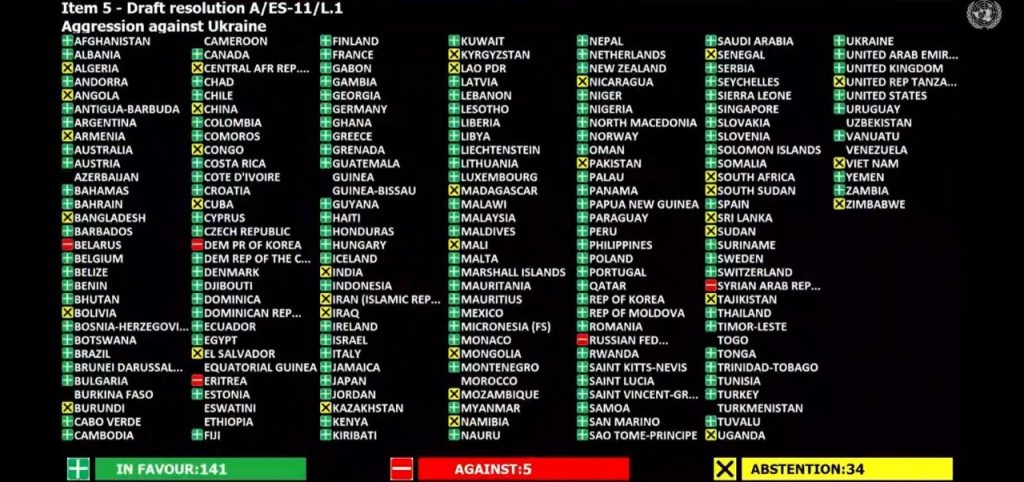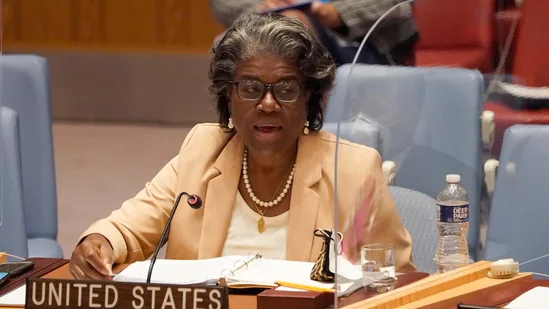NEW YORK, New York – While 141 countries have voted to condemn the Russian invasion of Ukraine, 5 countries have voted against the United Nations General Assembly resolution, while another thirty-four have abstained.
The resolution “demands that the Russian Federation immediately, completely, and unconditionally withdrawall ofits military forces from the territory of Ukraine within its internationally recognized borders,” and expresses, “grave concern at reports of attacks on civilian facilities such as residences, schools, and hospitals, and of civilian casualties, including women, older persons, persons with disabilities, and children.”
In all, 73 percent of the 193 member nations of the United Nations voted to support the resolution.
Predictably, Russia voted against the resolution, as did Belarus which is being used as a launchpad for the Russian military offensive and is reportedly preparing to send in ground troops. Syria, which has received strong support from Russia during its 11-year civil war, also voted against the resolution. As did North Korea and the east African nation of Eritrea.
Russian ally China was among those that abstained from the vote. Other strong Russian allies Cuba, India, El Salvador, and Pakistan also abstained.
Saudi Arabia, whose defacto leader Crown Prince Salman has a close relationship with Russian President Vladimir Putin, supported the resolution. Israel, which had been wavering in its condemnation of the invasion, too jumped on board. The United Arab Emirates, which has strong and developing ties with Russia, also voted in favour of the resolution, despite abstaining on a similar resolution last week at the UN Security Council.
Others to abstain included former Russian states Kyrgyzstan, Kazakhstan, and Tajikistan, as well as neighbouring Central Asian country Mongolia. Iran and Iraq withheld their votes.
Zimbabwe, Tanzania, South Africa, Congo, Sri Lanka, Sudan, and South Sudan abstained. As did Namibia, Mozambique, Armenia, Angola, Algeria, the Central African Republic, Bolivia, Bangladesh, Burundi, Madagascar, Laos, Mali, Nicaragua, Senegal, and Uganda.

“The fate of Ukraine is our fate; today, we are all Ukrainians,” Luxembourg’s told the General Assembly, mirroring a thread of solidarity woven throughout the three-day-long meeting. Supporting the proposed resolution means voting to save lives, he said, noting Luxembourg’s co-sponsorship of the draft that, among other things, calls for peace talks and the full withdrawal of Russian forces from Ukraine.
Many other delegates also announced their co-sponsorship of the draft, with Spain’s representative saying that its subject centres on the sovereignty of Ukraine, the defence of peace and the diplomatic resolution of conflict, as well as “the very reason the United Nations exists”. Echoing broad condemnations of the invasion of Ukraine, he said: “Every minute of resistance makes the attackers’ self-justification vanish into thin air.”
Germany’s delegate said the Russian Federation’s war marks the dawn of a new era, and today, there is a new reality that President Vladimir Putin has forced upon the world, requiring all States to make firm decisions and take a side. Germany will always be committed to diplomacy, but when peaceful approaches come under attack, she said “we must act responsibly and unite for peace”. As the Assembly prepares to vote on the draft resolution, she stated that: “Now, we all have to choose between peace and aggression, between justice and the will of the strongest, between taking action and turning a blind eye.” While Germany is providing food, aid and shelter for refugees, she said it has decided to support Ukraine militarily to protect itself, in line with Article 51 of the Charter.
Speakers roundly called for an end to violence and a start to constructive peace talks. Some drew attention to the conflict’s origin. The representative of the Democratic People’s Republic of Korea said the root cause of the current situation rests with the United States and other Western countries. These States have systematically undermined the European security environment by defying the Russian Federation’s reasonable demand for legal security guarantees and pursuing the eastward expansion of the North Atlantic Treaty Organization (NATO). Recalling the violation of the sovereignty and territorial integrity of Iraq, Afghanistan and Libya by the United States and the West under the pretext of international peace and security, he said that it is “absurd” for such countries to mention respect for sovereignty and territorial integrity in the context of the Ukrainian situation.
Some delegates representing small States decried the “might makes right” concept, which many agreed must be replaced with the guiding principles of the Charter of the United Nations.
“This is a crisis for all of us, and we all must speak out for diplomacy and support this resolution,” said the representative of Antigua and Barbuda. The international community has the responsibility to speak out, “lest our silence be misconstrued as consent”. As such, he called on all countries – especially small island States – to affirm that “might is not right”.
Amid widespread condemnation of continued bombing and shelling across Ukraine that has seen more than 500,000 civilians fleeing the violence, some delegates shared their own experiences with war, recalling the horrors that faced their citizens.
“My country still exists today because the peoples of the United Nations at the time stood up immediately to the cries of the innocent lives,” said the representative of South Korea, adding that: “This is why my delegation does not see the situation in Ukraine as some distant tragedy.”
Many delegates announced pledges of humanitarian assistance to help the people of Ukraine, with some neighbouring States saying they were ramping up border capacities to swiftly help those fleeing the violence. Some speakers called attention to racist practices targeting people of African descent who are stuck in Ukraine, trying to escape to safety.
The representative of Saint Vincent and the Grenadines expressed dismay that people of African descent are being singled out unfairly as the refugee crisis unfolds, calling for equal, fair treatment of all peoples. Echoing that call, South Africa’s representative urged European countries to take steps to resolve the current situation whereby some African nationals and people of African descent at the borders of Ukraine are not allowed to cross and move to safety.

“The truth is that this war was one man’s choice and one man alone: President Putin. It was his choice to force hundreds of thousands of people to stuff their lives into backpacks and flee the country,” U.S. ambassador to the United Nations Linda Thomas-Greenfield told the General Assembly prior to the vote on Wednesday. “Those were President Putin’s choices. Now it is time to make ours. The United States is choosing to stand with the Ukrainian people,” she said.
Referring to efforts to welcome those fleeing Ukraine, Hungary’s representative said all cases of discrimination will be investigated and perpetrators held accountable. Highlighting ongoing initiatives to respond to requests from nations to evacuate their citizens from Ukraine, she said Hungary has allowed entrance for all those fleeing war without restrictions or discrimination as to race, ethnicity, religion, or country of origin.
Many speakers stressed the importance of human rights and adhering to the founding principles of the United Nations Charter. Recalling that the Charter has been thrown out the window when it has suited powerful States, Ghana’s delegate stated said: “Across this hall and throughout our Organization’s history, there is enough blame to go round.” However, he warned against opening old wounds, which only creates fresh ones. Indeed, given the Security Council’s constraints, he stated that it is now the General Assembly’s responsibility to act.
Agreeing, Jamaica’s delegate said that inaction by the international community would be unacceptable, adding that: “In the eternal and inspiring words of Bob Marley, therefore, let us all get up and stand up for the rights of all the people of Ukraine, because today – we are all Ukraine.”
Among others delivering statements were representatives of Colombia, Paraguay, Dominican Republic, Suriname, Brunei Darussalam, Palau, Antigua and Barbuda, Federated States of Micronesia, Australia, Guyana, Papua New Guinea, Timor-Leste, Monaco, Belize, Gabon, Cuba, Samoa, Philippines, Cabo Verde, Malta, Malaysia, Kuwait, Malawi, Marshall Islands, Israel, Andorra, Cote d’Ivoire, Republic of Moldova, Nepal, Grenada, Bosnia and Herzegovina, Trinidad and Tobago, Venezuela, Vietnam, Argentina, Thailand, Niger, Nicaragua, Romania, Montenegro, San Marino, Cyprus, Portugal, Zambia, Bangladesh, North Macedonia, Vanuatu, Haiti, Tonga, the Democratic Republic of the Congo, Nigeria, Mauritius, Tunisia, and Qatar.






